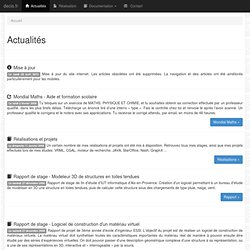

C++ - Derived Functor with any return type and any parameters. Thinking in C++ 2nd edition Volume 2. Le lundi 2 février 2009 Tu bloques sur un exercice de MATHS, PHYSIQUE ET CHIMIE, et tu souhaites obtenir sa correction effectuée par un professeur qualifié, dans les plus brefs délais.

Télécharge un énoncé tiré d’une interro « type ». Fais le contrôle chez toi et renvoie le après l’avoir scanné. Un professeur qualifié le corrigera et le notera avec ses appréciations. Tu recevras le corrigé attendu, par email, en moins de 48 heures. Mondial Maths » Le dimanche 11 janvier 2009 Un certain nombre de mes réalisations et projets ont été mis à disposition. Réalisations » Le samedi 27 décembre 2008 Rapport de stage de fin d'étude d'IUT informatique d'Aix-en-Provence. Rapport » Le samedi 27 décembre 2008 Rapport de projet de 3ème année d'école d'ingénieur ESSI. Rapport » Le samedi 27 décembre 2008 Rapport de stage de fin d'étude d'école d'ingénieur ESSI: Laboratoire Virtuel de Systèmes Energétiques Solaires - Développement d'un outil de simulation thermique.
Rapport » ToutVendre.Fr » Overloaded functor inheritance and templates - comp.lang.c++.moderated. Functor compose 3 : Functor « Development « C++ Tutorial. A look at the Boost Bind and Function libraries. Download source - 1 Kb If you are a C++ developer and aren’t yet familiar with the Boost libraries, I encourage you to start experimenting with it.

Boost is comprised of many different libraries covering categories from generic programming to memory pool management & smart pointers. Many of the libraries are standalone thus allowing you as the developer to focus only upon those functions of interest. The libraries are peer-reviewed portable C++ code. The libraries are free. One last point worth mentioning before introducing the Bind & Function libraries is that all the libraries rely on advanced C++ features such as templates and the Standard Template Library (STL). Boost::bind augments the capabilities provided by the standard library functions std::bind1st and bind2nd. I have chosen to illustrate the power of the bind & function libraries by implementing the Command Pattern using static polymorphism. The preferred syntax flows nicely, replicating a function declaration. 4thmouse.com » What is a C++ Functor? I did a presentation on the spirit library in the flesh recently and was surprised to find the big sticking point was C++ functors.

So I thought I’d cover the concept here. Functors provide a generic callback mechanism al la C function pointers. In C you typically see the following (see this): void sort(void *data, size_t element_size, size_t element_count, int (*comp)(const void *, const void *) ){ ... //equivalent to int diff = (*comp)(a,b) int diff = comp(a, b); ... } where a comparator is passed as a function pointer to the sort. template<class IteratorT, class FunctorT> void sort(IteratorT start, IteratorT end, FunctorT func){ .... int diff = func(*a, *b); .... } where IteratorT could be a pointer or an iterator object and FunctorT can be anything that supports the value = func(..arglist...) syntax. C++ Functors - and their uses.